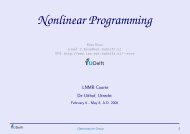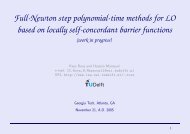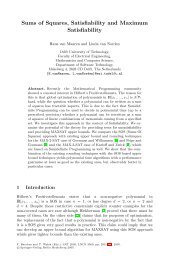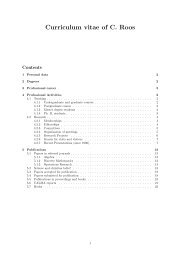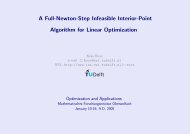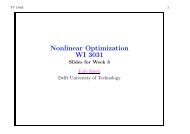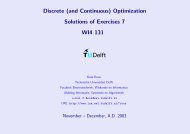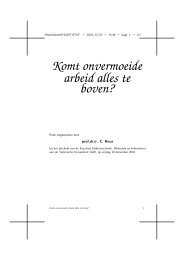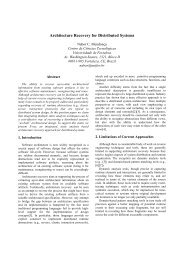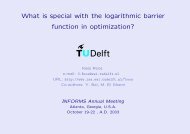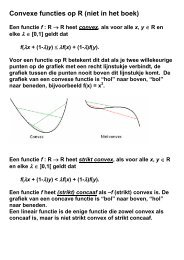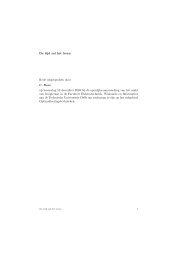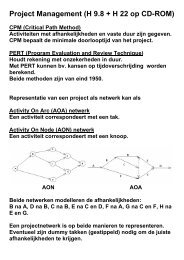On improving efficiency of model checking through systematically ...
On improving efficiency of model checking through systematically ...
On improving efficiency of model checking through systematically ...
You also want an ePaper? Increase the reach of your titles
YUMPU automatically turns print PDFs into web optimized ePapers that Google loves.
Our method to get out <strong>of</strong> the problem is to restrict the number <strong>of</strong> iterations<br />
that a system can loop around the good location. However, this<br />
method is not a complete solution since it means that only a part <strong>of</strong> the<br />
state space is verified.<br />
In conclusion, experiment results on a few case studies are negative at<br />
the time when this thesis is written. It remains the problem <strong>of</strong> state space<br />
explosion and thus we have not reached our goal <strong>of</strong> efficiently obtaining a<br />
reasonable combination <strong>of</strong> two tools. Anyhow, our work sets up a foundation<br />
for the evaluation <strong>of</strong> the possibility <strong>of</strong> combining Nbac and PMC/Uppaal and<br />
for further improvements to solve the problem <strong>of</strong> combining these tools. This<br />
work also helps us to gain more insight on approaches implemented in these<br />
tools and the general problem <strong>of</strong> <strong>model</strong> <strong>checking</strong>. We found that abstract<br />
<strong>model</strong>s generated by Nbac are not very well-fitted to be verified by Uppaal.<br />
An Nbac abstract <strong>model</strong> helps Nbac to accelerate the verification but not<br />
Uppaal for the reason that the Nbac abstract <strong>model</strong> is defined to work with<br />
the verification approach in Nbac only. We believe that this problem is<br />
dependent on specific tools employed in our combination approach.<br />
Related work. There have been studies to employ abstraction techniques<br />
to <strong>model</strong> <strong>checking</strong> to overcome the state space explosion problem,<br />
for example [14, 17]. The main difference is that the abstraction technique<br />
is “embedded” into the <strong>model</strong> <strong>checking</strong> algorithm in those works. That<br />
means the data structures and algorithms are tailored for the abstraction<br />
technique used. Our approach works at a higher level, between existing<br />
tools and <strong>model</strong>s <strong>of</strong> the system being verified. <strong>On</strong> the one hand, integrating<br />
abstraction technique into the <strong>model</strong> <strong>checking</strong> algorithm gives us more control<br />
and flexibility in the development <strong>of</strong> a specific <strong>model</strong> checker. <strong>On</strong> the<br />
other hand, combining existing tools provides the possibility to reuse the<br />
solution and part <strong>of</strong> the implementation work if we are successful with the<br />
approach. However, to our knowledge, there has been no successful story <strong>of</strong><br />
this direction reported until now.<br />
A successful work to develop an independent abstraction tool for explicit<br />
<strong>model</strong> <strong>checking</strong> approach in Spin is reported in [15]. This work leads to<br />
the idea <strong>of</strong> developing a general abstraction tool intentionally for a class <strong>of</strong><br />
symbolic <strong>model</strong> <strong>checking</strong> approach in real-time <strong>model</strong> checkers such as PMC,<br />
Uppaal, Hytech, etc. Such an abstraction tool will be more useful for these<br />
<strong>model</strong> checkers than Nbac since Nbac is not developed to serve as a general<br />
abstraction tool for them.<br />
Future work. This thesis work started from the combination between<br />
Nbac and PMC but ended with the combination between Nbac and Uppaal.<br />
We conclude that it is impossible to proceed the work <strong>of</strong> combining Nbac<br />
and PMC with the current status <strong>of</strong> PMC. However, it should be possible to<br />
60



